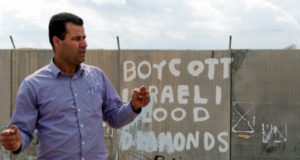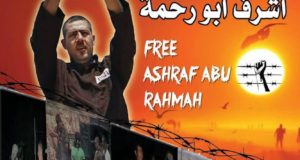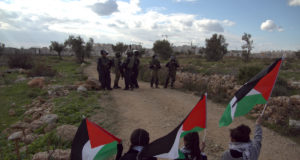Translation from original Hebrew by Rann Bar-on
Waji Burnat, whose son was injured six years ago from Israeli army fire and has since been confined to a wheelchair, welcomed the Supreme Court’s decision. Now he’s considering suing for compensation. “Any amount of money will help the recovery”.
by Itamar Inbari, December 12th
“The Supreme Court’s decision proves that there are people who understand that Palestinians are human beings like any others.” – said Waji Burnat, a resident of the Palestinian village of Bil’in, this afternoon to NRG/Ma’ariv. His son Ranni, 26, was injured at the start of the Intifada and has since been confined to a wheelchair. Burnat added that any amount of money his son will receive from the Israeli state would help in his recovery.
Ranni Burnat was seriously injured from Israeli live fire soon after the start of the Al-Aqsa Intifada in September 2000, a few days after the former Prime Minister Ariel Sharon visited the Temple Mount. Burnat, who was participating in a non-violent demonstration in Ramallah at the time, was hit with live ammunition. The bullet that penetrated his neck paralyzed him, and since then he has been confined to a wheelchair.
Ranni’s father says that he has previously tried to sue the Israeli army and even contacted a lawyer. When the latter did not return his calls, he understood that the probability of the case reaching the courts was small due to the “Intifada law”.
Today, after he heard about the Supreme Court decision, Waji Burnat said that he hopes to sue the state. “My son is the most precious thing I have and what has happened is in the past already. Any amount of money Ranni will get will help his recovery,” he said. The father praised the Supreme Court judges for their decision. “I feel that there are people who understand that Palestinians are human, just like everybody else,” he said with satisfaction.
“Comprehensive Damage”
Today, an expanded panel of Supreme Court judges decided unanimously that Palestinians injured during Israeli army operations in the last six years can sue the state for damages. Nine judges, headed by the former Supreme Court president Aharon Barak, canceled the amendment to the compensation law that removed the right of Palestinians to sue and ruled it unconstitutional. Despite that, the Supreme Court left as written the part of the law barring members of terrorist organizations and subjects of enemy states from suing the state.
The Supreme Court partially accepted an appeal filed by nine human rights organizations, including Adalah and the Association for Civil Rights and canceled an amendment to the damages law that was approved by the Knesset 18 months ago. According to the amendment, the Minister of Defense can declare areas in the Occupied Territories to be “zones of conflict”, even if no combat activity took place in them. The amendment to the law was approved in July 2005, but was applied retroactively to damages caused to Palestinians from the end of September 2000.
Since then thousands of claims for damages were submitted by Palestinians to various courts around the country. According to estimates, their total monetary value is tens, or even hundreds of millions of shekels. The amendment to the law gave the state immunity from such claims and and de facto removed the right of Palestinians from the Occupied Territories to sue for damages. In the verdict, the judges stated that the removal of responsibility from the side of the state for damage caused to Palestinians contradicts the rights set forth in “Basic Law: Human Dignity and Freedom.”
“We must remember that the territories of Judea and Samaria, as well as Gaza until August 2005, were subject to combat status for almost forty years”, wrote Barak in the verdict. “The security forces maintain a permanent and continuous presence in those areas. This kind of blanket immunity given to the state means that the state gets a pardon from responsibility for damages with regard to a wide range of activities unrelated to combat. It means that many victims, who were never involved in any hostile activities, are left with no compensation for the damage caused to their lives, their bodies and their property. Such comprehensive disregard for their rights does not align with the duties of the Israeli state.”
 International Solidarity Movement Nonviolence. Justice. Freedom.
International Solidarity Movement Nonviolence. Justice. Freedom.


